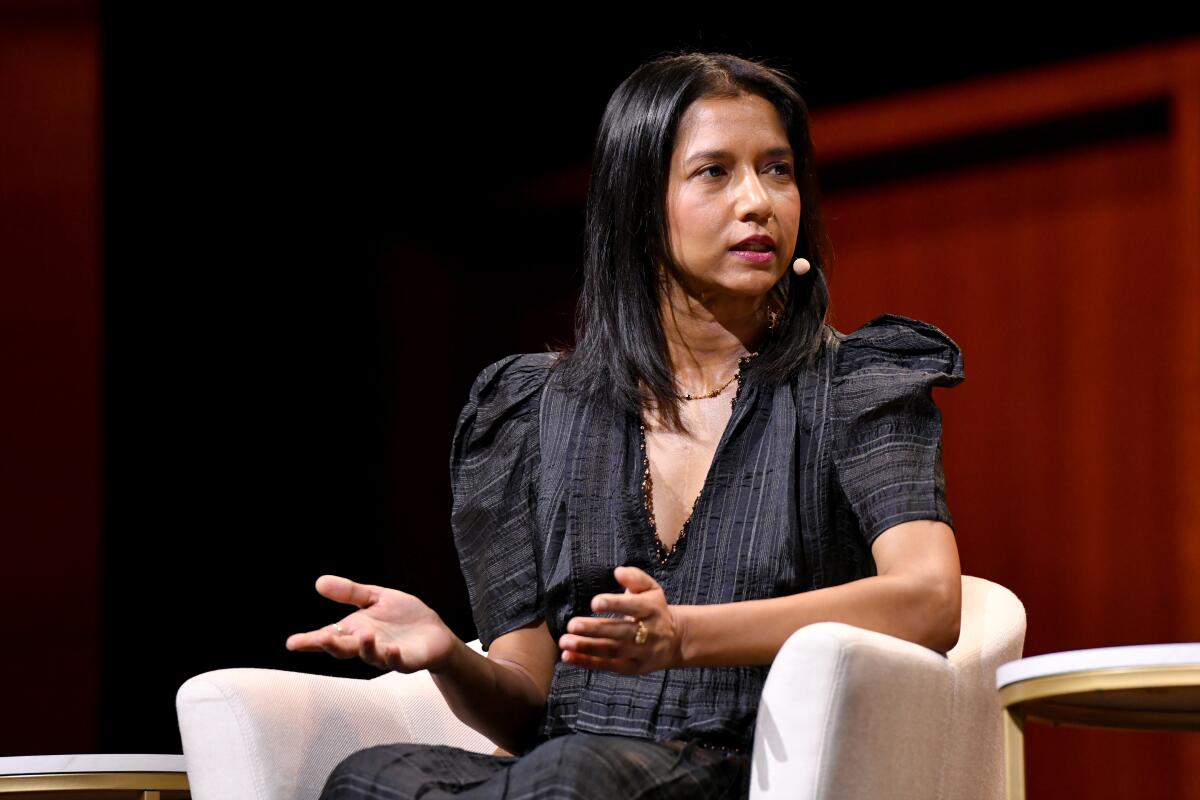Column: Eric Schneiderman accuser shows us weâre all victims of men taught to dominate the world

Tanya Selvaratnam is a tireless advocate for womenâs rights. Her accomplishments and awards â as an actor, artist, film producer (including of the Emmy-nominated âBorn to Flyâ) and book author (âThe Big Lie: Motherhood, Feminism and the Reality of the Biological Clockâ) â are too numerous to count. (I tried.)
Now sheâs famous for something else: Selvaratnam is one of several women who in May 2018 went public with allegations of physical abuse by Eric Schneiderman, who was then attorney general of New York.
Three hours after the New Yorker published the womenâs accusations, Schneiderman, who denied the allegations and then later apologized, resigned his post.
Selvaratnamâs enlightening memoir, âAssume Nothing: A Memoir of Intimate Violence,â will be published in the spring. Itâs a significant entry in the growing literature of the #MeToo movement. The book spells out why a self-possessed feminist might stay with a man whoâs done what Schneiderman is accused of. More striking: âAssume Nothingâ demonstrates how the promises and threats of our patriarchal society corrode not just the lives of its victims but the consciences of perpetrators as well.
In Selvaratnamâs telling, Schneiderman, who by many reports was psychologically domineering under the best of circumstances, turned vicious in bed. She claims he called her his âbrown slaveâ and asked her to address him as âmaster.â She confided to a friend, who showed the New Yorker the notes she kept about the conversation. Alcohol made matters exponentially worse.
So why didnât Selvaratnam head for the authorities immediately? Why was Schneiderman her partner for nearly a year?
Maybe these questions should be obsolete. Indeed, the many compelling and complex reasons people donât leave abusive situations have been amply documented.
But for those who still donât get it, hereâs an analogy: Youâre a confident, accomplished middle-aged man who nonetheless gets into a drunken fight with your older brother. Suddenly, he cold-cocks you. Do you run to the nearest police station to file a report? Not likely. You pride yourself on stoicism. You believe youâre complicit. Youâre preoccupied with concealing your own injuries, shame and fury. Youâre emotionally committed to the perp and more concerned about him than his next target.
This is the woeful story of almost all domestic violence. Now add to this that Schneiderman was the top law enforcement officer in the state of New York, renowned for his commitment to social justice and to feminist causes in particular. He was intimidating. One of the women who spoke to the New Yorkerâs Jane Mayer and Ronan Farrow summed him up with his own preening assessment: âI am the law.â
Selvaratnamâs book is not fundamentally a work of revenge or even an exposĂŠ. âI have sympathy for those who harm me,â she writes. That sympathy gives her work a singular sensitivity to the universally crushing effects of our social system of wolfpack power relations, with its grim emphasis on winners, who are coded male, and losers, who are coded female. All of us, in her vision, are caught in what Soviets used to call the relentless dynamic of âwho, whomâ â âWho will overtake whom?â
Selvaratnam was born in Sri Lanka and grew up in Long Beach. She remembers her father hitting her mother â the bruises, black eyes, bloody teeth. She writes of standing up to her father, and even helping her mother to divorce him, but she also has come to forgive him as a man with his own demons. Selvaratnam doesnât explicitly forgive Schneiderman in her book, but she sees him as suffering from demons as well, for which no amount of political power or social swagger could compensate.
âForgiveness is subjective,â Selvaratnam writes. And, indeed, few people can â or even should â try to muster it for their abusers. But one wouldnât have to forgive abuse to benefit from Selvaratnamâs hard-won wisdom. Her capacity to see violent men as vulnerable to the claims and rituals of contemporary patriarchy â with its central tenet that tyrannizing others is the goal of life â can be a lifeline to other victims of domestic abuse.
According to the National Coalition Against Domestic Violence, one in four women in America will be the victim of domestic abuse over the course of her lifetime. Memoirs like âAssume Nothingâ show precisely how any woman, whatever her intelligence or accomplishments, can come to tolerate abuse. Selvaratnamâs story also presents #MeToo and feminism not as the province of women only, with men cast merely as enemies or allies.
Selvaratnam shows how weâre all caught up in patriarchy, and not âpatriarchyâ as merely a woke buzzword but as a form of social and even governmental organization that implies male âownershipâ of women, children and the world.
We are all better off when abusers are stripped of their medals. If they retain their real-world power, it re-inscribes their pretext for treating others as property. The first step to ending abuse is ending the spell exerted by patriarchal lies and the trappings of power. Once Selvaratnam could clear her mind of the âwhom, whomâ paradigm, she saw her âmasterâ as a hollow man, prattling on about falling poll numbers and unmet fundraising goals as he ran for reelection. It set her free.
Twitter: @page88
More to Read
A cure for the common opinion
Get thought-provoking perspectives with our weekly newsletter.
You may occasionally receive promotional content from the Los Angeles Times.










